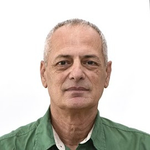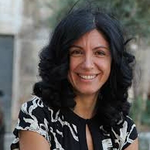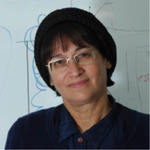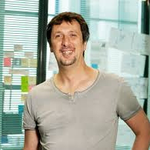When
Wednesday, November 25, 2020 (15:00 - 19:00) GMT+2
Speakers

Cosimo Distante
Faculty of Engineering at CNR & University of Salento Lecce
"How computer vision technology may be employed to evaluate social interaction capabilities: application to emotion production in ASD children"
Face analysis is one of the latest developing methodologies to measure social interaction between machines and humans. Understanding gaze, face expression is at the basis of human machine interaction. This talk is related to the research activity conducted at CNR-ISASI concerning the development of assistive methodologies to evaluate children’s ability to produce emotions. The research addresses both ASD and typically developing children. We show how computer vision can be exploited in an assistive setting with wearable devices to evaluate facial emotions and allow expert to provide reinforcement in a timely way.

Doron Friedman
Head of Advance reality Lab at IDC
Virtual humans in virtual reality, augmented reality, and telepresence
Integrating automated virtual humans in virtual reality (VR) allows for simulation of social scenarios, for psychotherapy, counseling, and social skill training, among others. Such virtual humans can also accompany participants in the real world with wearable augmented reality (AR), when this becomes more widely available. Finally, using telepresence technologies it is possible to bring groups of people together, represented as avatars, allowing for social interactions well beyond those possible with video conference; this has become highly desired following the 'social distancing' that resulted of the Covid 19 outbreak. Furthermore, these remote controlled virtual humans in telepresence can be partially controlled by software. All these platforms offer a wide range of opportunities for diagnosis and treatment of social and communication disorders, but require easy to use high fidelity expressive virtual humans. Furthermore, recent breakthrough in 'deep learning' allow aiming at more realistic appearance and behavior by such virtual humans. In the last few years our lab has developed such a virtual human platform, taking part in various basic and applied research projects. I will briefly discuss the technical progress in this field, based on generative deep networks, and then provide several examples of projects deploying these virtual humans.

Franca Garzotto
Politecnico di Milano
"Advanced interactive technologies for cognitive impairment: opportunities and barriers for adoption"
Advanced interactive technologies – ranging from virtual and augmented reality to smart objects and smart spaces to conversational agents – offer enormous opportunities to complement and enhance current therapeutic and educational approaches for persons with cognitive impairments, particularly children. After a short overview of examples in this arena, I will discuss the challenges related to designing such technologies for the specific needs of this population, as well as the socio-organizational complexity of having them adopted in real-life contexts (therapeutic center, school, home) and evaluating their benefits.

Ofer Golan
Head of Autism Research Lab at the Department of Psychology at Bar-Ilan University
"What advanced technologies can and cannot (yet?) do in socio-emotional interventions for individuals with autism spectrum disorder"
Technology based interventions have been used for the socio-emotional support of children and adults with autism spectrum disorder (ASD) for the last two decades. Their effectiveness in areas such as emotion recognition has been validated extensively. However, the use of advanced technologies in the treatment of individuals with ASD has mostly remained the focus of academic enquiry, with little effect on the clinical field. This presentation will examine potential obstacles in the transition of advanced technologies from the lab to the field, and ways technology could be more easily integrated into clinical and educational practice.

Dov Greenbaum
Director of Zvi Meitar Institute
"The Ethics of Human Neuro-Enhancement"
When discussing medical and technological interventions ethicists distinguish between therapeutic interventions and enhancements. In the area of cognition the delineation as to what is or is not therapeutic is non-trivial. This is increasingly complicated by the emerging field of disability rights that sees individually as differently abled, not necessarily disabled. We will explore technological enhancements in the area of cognitive abilities in light of these developments

Tsvi Kuflik
Professor at University of Haifa
"Personalized rehabilitation – the dual role of personalization – supporting both patient and therapist"
Personalization may provide dual support in rehabilitation. It may challenge and engage the patient by continuously monitoring and adapting the difficulty of the exercises, while keeping the patient in a comfort zone – not too challenging and not too easy. It may also free the therapist from the need to interact with the technology and interfere with the ongoing session for adapting system parameters. The talk will briefly present an overview of the state of the art in personalized rehabilitation and present one case study of a personalized rehabilitation system for children with CP.

Maria Luisa Scattoni
Coordinator of the Italian network for the early recognition of autism spectrum disorders at Istituto Superiore di Sanità
"Suggestions and limitations about the use of innovative technologies in autism spectrum disorder"
The use of technology is taking an increasingly prominent role in research, clinical, and educational practices related to Autism Spectrum Disorder (ASD). ASD is a neurodevelopmental disorder characterized by social and communication impairments and restricted or repetitive behaviours, without definite biomarkers. Improving the identification of very early ASD symptoms, as well as earlier interventions, is a priority for researchers. Technological advances, endorsed by the collaboration among clinicians, technologists, engineers, and various stakeholders in the ASD community, can potentially support the process of early screening and diagnosis of children with ASD and promote the development of innovative and more effective treatment strategies. Effective technology-based programs may influence outcome in relation to social, cognitive, emotional, and functional daily activities and enhance quality of life for people with ASD and their families.
Despite several limitations, reasonable progress has been achieved with artificial intelligence approaches in improving genetic and behavioural diagnostics and in predicting risk of ASD and other neurodevelopmental disorders. In addition, current evidence on innovative technology interventions, including computer programs, virtual reality, and robotics are heterogeneous and provide support for continuing the development of technology-based interventions for individuals with ASD and the evaluation of their effectiveness.
Many challenges need to be faced regarding feasibility of technological tools in the real research and clinical settings. For example, 1) machine learning algorithms heavily depend on training datasets, and consequently, the quality of the input data is extremely important to ensure the accuracy of a protocol on data collection and cleaning; 2) ethical issues around data privacy; 3) lack of integration of multiple modalities for a more comprehensive understanding of an individual; 4) the majority of current advancements in artificial intelligence technology are based on retrospective data. Despite these challenges, innovative technologies could be an opportunity to automate and accelerate some of the processes in the diagnostic and intervention pathways and to reach promising implications for clinical care and healthcare system.

Patrice L. (Tamar) Weiss
PhD, OT Dept. of Occupational Therapy, Faculty of Social Welfare and Health Sciences at University of Haifa
"Virtual gaming as a means to achieve novel treatment for children with cognitive and motor impairments"
Increasingly, clinicians have come to recognize the potential benefits of incorporating virtual reality (VR) as an attractive alternative or adjunct to conventional treatment protocols for treating children with cognitive and/or motor disabilities. Virtual environments appear to provide opportunities to learn and practice various skills safely and enjoyably to achieve meaningful and motivating goals. Moreover, VR-based interventions incorporate effective elements of motor learning (i.e., multiple movement repetitions, feedback of performance and results) within an ecologically valid context that can be readily graded and documented. The goal of this presentation is to review the evidence for the use of VR as a treatment tool for children with disabilities.

Massimo Zancanaro
Professor of Computer Science Department of Psychology and Cognitive Science at University of Trento
"AI for therapy: technical opportunities and potential risks – a perspective from mediation theory"
Mediation theory is a conceptual framework to analyze the roles technologies play in our life. It has been initially proposed by the philosopher Don Idhe and it describes four basic ways in which technology mediates our relationship with the world. In this talk, I use the mediation theory approach to elaborate a structured perspective on how digital technologies based on Artificial Intelligence can be used to support the practices of therapists, in particular for what concerns social training for people with social impairments.